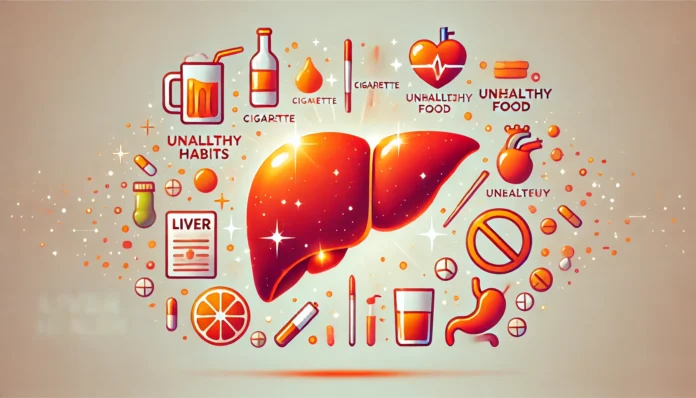The liver is one of the most vital organs in the human body, responsible for detoxification, protein synthesis, and the production of biochemicals necessary for digestion. However, many of our daily habits can negatively impact this powerhouse organ, leading to liver damage over time. Here are six poor habits that harm your liver and what you can do to prevent long-term damage.
1. Excessive Alcohol Consumption
Why It’s Harmful:
Alcohol is one of the leading causes of liver damage worldwide. When consumed in excess, alcohol creates a toxic byproduct called acetaldehyde, which inflames liver cells, leads to fatty liver disease, and can progress to conditions like hepatitis, fibrosis, or cirrhosis.
Signs of Damage:
- Fatigue
- Jaundice (yellowing of the skin and eyes)
- Swollen abdomen or legs
How to Prevent:
- Limit alcohol intake to the recommended guidelines: up to one drink per day for women and two for men.
- Incorporate alcohol-free days into your routine to give your liver time to recover.
2. Poor Diet Choices
Why It’s Harmful:
A diet high in processed foods, trans fats, and sugars can lead to the accumulation of fat in the liver, resulting in non-alcoholic fatty liver disease (NAFLD). Over time, this can impair liver function and lead to inflammation and scarring.
Signs of Damage:
- Unexplained weight gain
- Fatigue
- Discomfort in the upper right abdomen
How to Prevent:
- Focus on a balanced diet rich in fruits, vegetables, lean proteins, and whole grains.
- Avoid excessive consumption of sugary beverages and fried foods.
3. Sedentary Lifestyle
Why It’s Harmful:
A lack of physical activity contributes to obesity, which increases the risk of developing fatty liver disease. A sedentary lifestyle can also slow down metabolism, making it harder for the liver to function optimally.
Signs of Damage:
- Increased belly fat
- Sluggishness
- Elevated liver enzymes in blood tests
How to Prevent:
- Engage in at least 150 minutes of moderate-intensity exercise per week, such as brisk walking, swimming, or cycling.
- Incorporate strength training exercises to improve overall metabolism.
4. Overuse of Medications and Supplements
Why It’s Harmful:
Many over-the-counter (OTC) medications, particularly acetaminophen (paracetamol), and certain herbal supplements can stress the liver when taken in high doses or for prolonged periods. The liver processes these substances, and overuse can lead to toxicity.
Signs of Damage:
- Nausea
- Dark urine
- Pain in the upper right abdomen
How to Prevent:
- Always follow dosage recommendations for OTC medications and prescriptions.
- Consult a healthcare provider before taking herbal supplements, especially in combination with other medications.
5. Smoking
Why It’s Harmful:
Cigarette smoke contains toxins that not only damage the lungs but also affect the liver. The liver works overtime to filter out these harmful substances, which can lead to oxidative stress and inflammation, increasing the risk of liver disease and cancer.
Signs of Damage:
- Chronic cough and fatigue
- Jaundice
- Poor immune function
How to Prevent:
- Quit smoking and seek professional help if necessary.
- Avoid exposure to secondhand smoke.
6. Skipping Regular Health Checkups
Why It’s Harmful:
Many liver conditions, such as hepatitis or fatty liver disease, can develop silently without noticeable symptoms until they become severe. Skipping regular health checkups delays the early detection and management of these issues.
Signs of Damage:
- Late detection of liver-related diseases
- Advanced symptoms such as swelling or jaundice
How to Prevent:
- Schedule routine blood tests to monitor liver function (e.g., ALT and AST levels).
- Vaccinate against hepatitis A and B if not already protected.
Tips for a Healthy Liver
- Stay Hydrated: Drink plenty of water to help flush out toxins.
- Limit Salt Intake: Excessive salt can contribute to fluid retention and high blood pressure, straining the liver.
- Incorporate Liver-Friendly Foods: Foods like garlic, green tea, leafy greens, and turmeric support liver health.
- Maintain a Healthy Weight: Keep your BMI within a healthy range to prevent fatty liver disease.
- Avoid Environmental Toxins: Use protective gear when handling chemicals and avoid exposure to pollutants whenever possible.
Conclusion
Your liver is a vital organ that plays an indispensable role in maintaining overall health. By avoiding these six harmful habits and adopting liver-friendly practices, you can protect this essential organ and ensure it functions efficiently for years to come. Regular care and attention to your lifestyle choices can make all the difference in preventing liver-related complications and maintaining optimal health.
